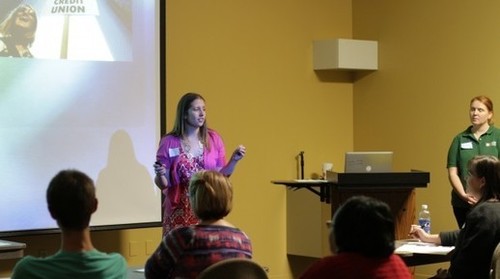Workshop program teaches faculty, students about financial literacy � The
September 19, 2012

 See on ucaecho.ne
See on ucaecho.ne
Arkansas Federal Credit Union educated students and faculty on the benefits of joining a credit union in its first "Dollars and Sense:
Would you like to Improve Your Financial Life?" class held Sept. 11 in the Brewer-Hegeman Conference Center.
The course is comprised of four classes, each designed to equip participants with the knowledge of improving and securing their financial lives. The first meeting introduced the fundamentals of a credit union, including its background, membership eligibility and benefits.
Debra Miller, administrative assistant at UCAs nursing department, said, "This class was very informative. I learned some things I never knew, even after being a credit union member for 13 years."
Elizabeth Duncan, Nick Trusty and Sarah Hackler from Arkansas Federal Credit Union handed out folders to each participant containing information about the presentation.
"Credit unions exist to help people," Duncan, assistant service center manager at Arkansas Federal Credit Union, said. "They are not for profit, but for service. Unlike banks, credit unions are exempted from federal taxes, but pay taxes only on property, sales and payroll."
She said the Internal Revenue Code acknowledged credit unions as tax exempt because they issue no capital stock, which is the amount of shares a company can sell.
"Members own credit unions and are democratically governed," she said. "Each member is granted equal ownership of the cooperative�and is a shareholder of the company. Once you deposit money into the account, you automatically become a shareholder."
Each member is entitled to one vote, regardless of how much they deposit. A volunteer board exists to govern the credit union.
Members of the board are elected by and from the credit unions members and serve voluntarily.
During the workshop, the presenters said credit unions do not issue stocks or pay dividends, money paid to shareholders from a companys profit, to outside stockholders. Instead they return earnings to members in the form of lower loan rates, higher interest on deposits, lower fees and newly improved services.
They pay higher dividends, lower interest rates to their members and have lower fees than banks.
"Credit unions are cooperatives,"�Trusty said. "So they work withnot incompetition with each other."
Duncan said membership is limited to a common bond called "field of membership," which applies to the applicants area and relationship with the credit union and its members.
"By federal statute, credit unions cannot serve the general public," she said. "You can qualify if you are a current employer, have organizational affiliations or have immediate family who are current members of the credit union."
Some credit unions have community-based field of memberships, extending membership to those who live and work in that area.
Duncan said credit union employees try to change every transaction into an interaction.
"We smile and greet everyone who walks into our door and try our best to make a good first impression," she said. "We try to deepen relationships with our members and greet them by their first names. We try to know our customers on a more personal level."
Credit unions are insured through the National Credit Union Share Insurance Fund, a government-supported insurance fund.
The next classes will be Sept. 25 on "Budgeting and Debt Elimination," Oct. 9 on "Checking Accounts, Checks, Debit Cards, and Using Them Efficiently" and Oct. 23 on "Protecting Yourself Financially."
Classes are free and will be in the Brewer-Hegeman Conference Center.
